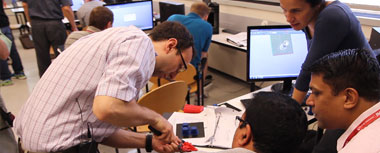Short Programs
Principles and Applications of Biocatalysis
This course is in development for the future.
The below description should be taken as an example of content and is subject to change.
If you are interested in this course, please
sign up for email updates and/or check this course page at a later date.
Overview | Learning Objectives | Who Should Attend | Course Content | About the Lecturers | Location | Updates
Overview
This course is designed to introduce participants to the fundamentals of enzyme-catalyzed reactions, especially as they apply to large-scale production of small molecules. We will cover the EC system for enzyme classification and key reaction classes demonstrated in commercial processes. Fundamentals of enzyme mechanisms will be presented. Considerations for the use of purified enzymes over whole cell catalysts will be discussed, as well as procedures for cloning enzymes of interest. Case studies will be used to illustrate the concepts presented. Advanced topics include the design of multi-step biosynthetic pathways. Approximately 30-40% of the course will be dedicated to a hands-on laboratory component. In the lab sections, student will translate the basics of gene cloning into practice, with exercises for design of primers for gene amplification, cloning of genes into expression vectors, verification of protein expression, enzyme purification, and determination of enzyme kinetics.


![]() Fundamentals: Core concepts, understandings and tools (40%)
Fundamentals: Core concepts, understandings and tools (40%)
![]() Latest Developments: Recent advances and future trends (25%)
Latest Developments: Recent advances and future trends (25%)
![]() Industry Applications: Linking theory and real-world (35%)
Industry Applications: Linking theory and real-world (35%)


![]() Lecture: Delivery of material in a lecture format (50%)
Lecture: Delivery of material in a lecture format (50%)
![]() Labs: Demonstrations, experiments, simulations (50%)
Labs: Demonstrations, experiments, simulations (50%)


![]() Introductory: Appropriate for a general audience (75%)
Introductory: Appropriate for a general audience (75%)
![]() Specialized: Assumes experience in practice area or field (20%)
Specialized: Assumes experience in practice area or field (20%)
![]() Advanced: In-depth explorations at the graduate level (5%)
Advanced: In-depth explorations at the graduate level (5%)
Learning Objectives
- To learn the basic classes of enzymes and industrially useful enzyme reactions.
- To understand considerations for the use of purified enzymes versus whole cell catalysts.
- To consider opportunities for the design of multi-step biocatalytic routes.
- To gain hands-on experience in cloning and expression of recombinant enzymes.
Who Should Attend
Participants with some background in biology, chemistry or engineering comprise the targeted audience. The course is likely not appropriate for students with advanced knowledge of biochemistry or molecular biology.
Course Content and Lecture Material
The lecture material is designed to provide a fundamental introduction to the topic as well as to complement the applied, laboratory component. The following topics will be discussed during the lectures:
Enzyme catalysts
- Overview/review of protein chemistry
- The Enzyme Commission (EC) nomenclature
- Enzyme kinetics
- Enzyme inhibition and toxicity
Whole cell catalysts
- Considerations for applications of whole cell catalysts
- Decoupling growth and conversion
- Control of protein expression
- Toxicity and inhibition
- By-product formation
Process design for Biocatalytic processes
- Typical problems encountered in industrial biocatalysis
- Engineering (process design) solutions
- Biological (protein/cellular engineering) solutions
Laboratory concepts
Participants will gain hands-on laboratory experience in the following methods relevant to bioconversions:
- Design of primers for gene amplification
- Polymerase Chain Reaction (PCR)-based amplification of genes
- Sub-cloning of amplified genes into expression vectors
- Transformation of microbial strains
- Protein expression and purification
- Enzyme assays and determination of kinetic parameters
About the Lecturers
Kristala L. Jones Prather
Kristala Jones Prather is an Associate Professor of Chemical Engineering at MIT and an investigator in the multi-institutional Synthetic Biology Engineering Research Center (SynBERC) funded by the National Science Foundation (USA). She received an S.B. degree from MIT in 1994 and Ph.D. from the University of California, Berkeley (1999), and worked 4 years in BioProcess Research and Development at the Merck Research Labs (Rahway, NJ). She is the recipient of a Camille and Henry Dreyfus Foundation New Faculty Award (2004), an Office of Naval Research Young Investigator Award (2005), a Technology Review “TR35” Young Innovator Award (2007), and a National Science Foundation CAREER Award (2010). Prather has been recognized for excellence in teaching with the C. Michael Mohr Outstanding Faculty Award for Undergraduate Teaching in the Dept. of Chemical Engineering (2006) and the MIT School of Engineering Junior Bose Award for Excellence in Teaching (2010).
Sarah O'Connor
Sarah E. O’Connor is an Associate Professor of Chemistry at MIT. Her research efforts focus on understanding how nature enzymatically constructs complex natural products, and how these metabolic pathways can be used to produce novel compounds. She received her B.S. in Chemistry from the University of Chicago and her Ph.D. from Barbara Imperiali working at both Caltech and MIT. She was an Irving S. Sigal post-doctoral fellow with Chris Walsh at Harvard Medical School.
Location
This course takes place on the MIT campus in Cambridge, Massachusetts. We can also offer this course for groups of employees at your location. Please complete the Custom Programs request form for further details.
Updates
There are no updates at this time.


